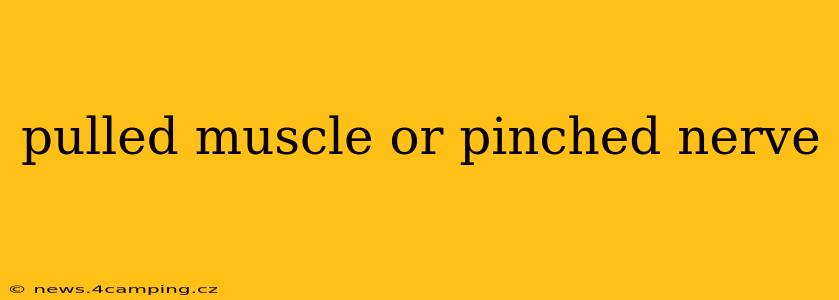Experiencing sharp pain, limited mobility, and overall discomfort? You might be wondering if you've pulled a muscle or pinched a nerve. While both conditions cause significant pain and can limit your daily activities, understanding the key differences is crucial for proper diagnosis and treatment. This comprehensive guide will help you differentiate between a pulled muscle and a pinched nerve, explore potential causes, and discover effective relief strategies.
What is a Pulled Muscle?
A pulled muscle, also known as a muscle strain, occurs when muscle fibers are overstretched or torn. This usually happens due to sudden movements, overuse, or inadequate warm-up before strenuous activities. The severity of a pulled muscle can range from mild discomfort to severe pain, depending on the extent of the damage. Common symptoms include:
- Pain: Localized pain in the affected muscle, often worsening with movement.
- Muscle spasms: Involuntary contractions of the muscle.
- Swelling: Inflammation and tenderness around the affected area.
- Bruising: In more severe cases, bruising may be present.
- Limited range of motion: Difficulty moving the affected muscle or joint.
What is a Pinched Nerve?
A pinched nerve, also known as a compressed nerve, happens when surrounding tissues, such as bones, muscles, tendons, or ligaments, put pressure on a nerve. This pressure can disrupt the nerve's function, leading to pain, numbness, tingling, and weakness in the affected area. The location of the pinched nerve dictates the symptoms experienced. Common causes include:
- Poor posture: Sustained postures that put pressure on nerves.
- Spinal stenosis: Narrowing of the spinal canal.
- Herniated disc: A bulging or ruptured disc in the spine.
- Repetitive movements: Repeated actions that strain muscles and put pressure on nerves.
- Trauma: Injury to the spine or surrounding tissues.
What are the Key Differences Between a Pulled Muscle and a Pinched Nerve?
While both conditions share some overlapping symptoms like pain and limited mobility, there are key distinctions:
| Feature | Pulled Muscle | Pinched Nerve |
|---|---|---|
| Primary Pain | Localized muscle pain, often aching | Sharp, shooting, or burning pain radiating down a limb |
| Numbness/Tingling | Usually absent | Often present, along with weakness |
| Weakness | May be present, but usually less severe | Can be significant, depending on nerve involvement |
| Swelling | Often present | Less common |
| Cause | Overstretching or tearing of muscle fibers | Compression of a nerve by surrounding tissues |
How Can I Tell if I Have a Pulled Muscle or a Pinched Nerve?
Diagnosing the specific condition requires a proper medical evaluation. A healthcare professional will assess your symptoms, medical history, and conduct a physical examination to reach an accurate diagnosis. Imaging tests like X-rays or MRIs may be necessary in some cases. Self-diagnosis can be misleading and delay appropriate treatment.
What are the Treatment Options for a Pulled Muscle?
Treatment for a pulled muscle typically involves:
- Rest: Avoiding activities that aggravate the injury.
- Ice: Applying ice packs to reduce swelling and pain.
- Compression: Using a bandage to support the affected muscle.
- Elevation: Raising the injured area to minimize swelling.
- Over-the-counter pain relievers: Ibuprofen or acetaminophen can help manage pain and inflammation.
- Physical therapy: Exercises to strengthen and rehabilitate the muscle.
What are the Treatment Options for a Pinched Nerve?
Treatment for a pinched nerve depends on the cause and severity. Options include:
- Rest: Avoiding activities that aggravate the condition.
- Over-the-counter pain relievers: NSAIDs can help manage pain and inflammation.
- Physical therapy: Exercises to improve posture, flexibility, and strengthen supporting muscles.
- Steroid injections: To reduce inflammation around the nerve.
- Surgery: In severe cases, surgery may be necessary to decompress the nerve.
Can a Pulled Muscle Cause a Pinched Nerve?
While not a direct cause-and-effect relationship, severe muscle spasms associated with a pulled muscle can sometimes indirectly put pressure on nearby nerves, leading to symptoms similar to a pinched nerve. However, this is less common than other causes of pinched nerves.
How Long Does it Take to Recover from a Pulled Muscle or Pinched Nerve?
Recovery time varies significantly depending on the severity of the injury, the individual's overall health, and the effectiveness of treatment. Mild strains may heal within a few weeks, while severe injuries may take months to fully recover.
When Should I See a Doctor?
Consult a doctor if:
- Your pain is severe or doesn't improve with home treatment.
- You experience numbness, tingling, or weakness.
- You have difficulty moving the affected area.
- You suspect a serious injury.
Remember, seeking professional medical advice is crucial for accurate diagnosis and appropriate treatment for both pulled muscles and pinched nerves. Early intervention often leads to faster and more effective recovery.
